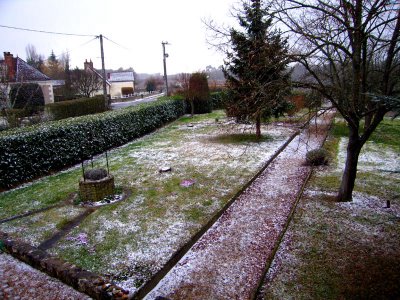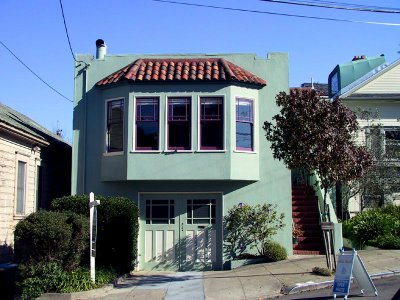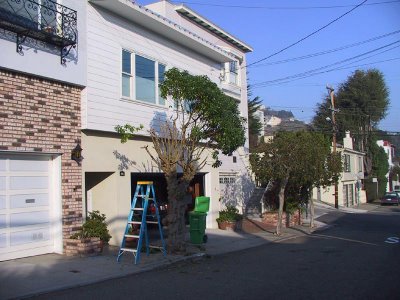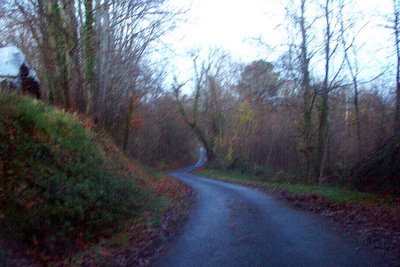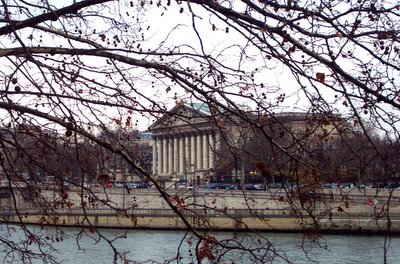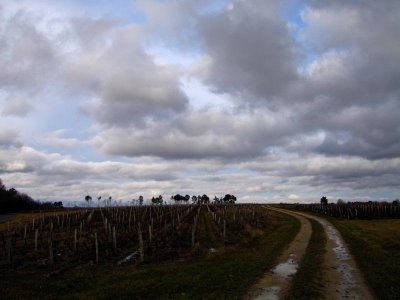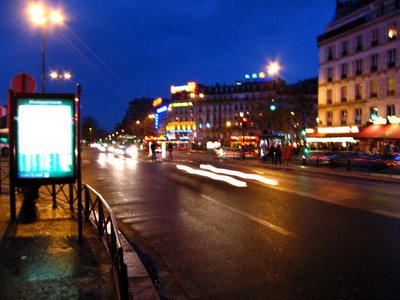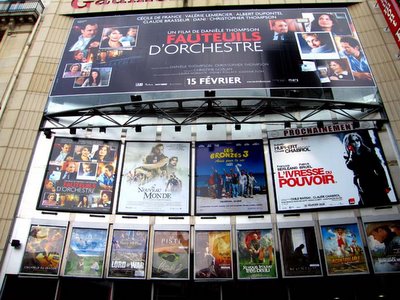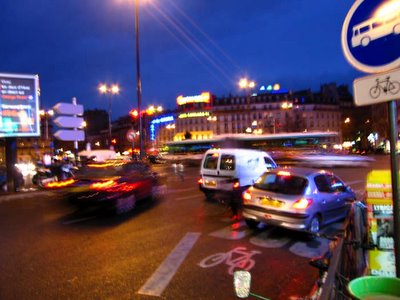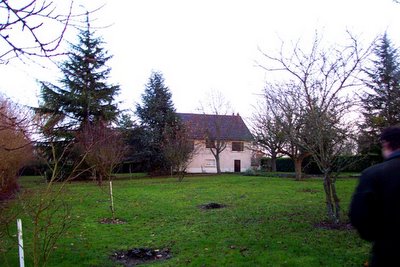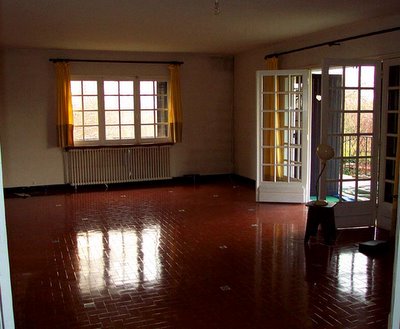At about 10:00, I left home to go run some errands in Saint-Aignan and across the river in Noyers. Saint-Aignan is all of two miles from the house. When I got there, the street that forks off the river road and leads to central Saint-Aignan was barricaded. There were several EDF (Électricité de France) and GDF (Gaz de France) trucks in the intersection, along with one firetruck and a Gendarmerie vehicle.
People were hanging out their windows watching the scene in the street below, which I couldn't see. I noticed one of my neighbors, Ludovic, who works for the municipality, out directing traffic, and waved at him. There was a woman out taking pictures of the curb and roadway, where they seemed to be digging a trench. I could see the flash of her camera. There were big metal barricades closing off the streets. I still don't know what was going on, but it was big excitement for Saint-Aignan.
I drove on along the river, hoping to take the next road into town. It's just a couple of blocks, but it too was blocked off -- by a Gendarmerie vehicle. The gendarme himself was standing there to make sure nobody tried to turn onto that street. I saw a parking space on the opposite side of the road, but I was afraid to try to take it by driving in from the wrong direction or making a U-turn, because the gendarme might give me a ticket.
Last Saturday I heard a song on the radio that said:
Quand un gendarme rit,
Dans la gendarmerie,
Tous les gendarmes rient,
Dans la gendarmerie...
Dans la gendarmerie,
Tous les gendarmes rient,
Dans la gendarmerie...
The third street into town was clear. It's a very narrow lane between two buildings, but just a couple of hundred meters in there is a small parking lot. Luckily, there was a space free. It was only a short walk up to the pharmacy and the optical shop, where I had business to do.
The pharmacy was relatively crowded, but there are five or six employees in the shop so I didn't have to wait long. I said bonjour to the blonde woman there who is always friendly and smiling. I didn't see Madame Smith, the pharmacist whose husband is Scottish and who usually comes out and shakes my hand in greeting when I enter the shop.
After a minute, one of the three men who work there, the short young one, waited on me. I was picking up monthly prescriptions for myself and Walt, so there was a list of them. (Getting old is hell.) I waited for a while, and I noticed the pharmacist searching shelf after shelf in the back of the store, behind the counter. He finally went to the computer and looked something up. Then he came over and told me that one of my medications was out of stock. "Don't worry," he said, "I'll go to the pharmacy down the street and get some for you. I won't be long."
I told him I had an errand to run across the street, so I would go get that done and come right back. That was fine.
The boutique across the street from the pharmacy is an optical shop. My favorite pair of glasses was giving me trouble. The right lens kept falling out when I was cleaning it. I tried to tighten the screw myself so that it would stay in, but to no avail. When I walked into the shop, the optician on duty was waiting on a woman who was getting glasses for her son, who lives in the Alps, from what I gathered.
He had put his glasses in his pants pocket when he went out skiing and had somehow broken them, she said. He sent them to his mother, who took them to be repaired. She chatted with the optician, telling her how her house was lonely now because her son was in school in the Alps and her husband was off on an extended business trip. Her only company was her cat, and it wasn't a very good conversationalist. As the two women chatted, the optician carefully packed the repaired glasses into a box and started to tape it up, but the woman said no, I have a note I wrote to my son that I want to put in the box. So she reopened it, took the glasses back out, waited while the customer carefully folded her note to fit, and the put everything back in the box. The note needed to go on the bottom, she pointed out.
After she put about 25 pieces of tape on the box to seal it well, she told the customer woman that she should send it via Colissimo at the post office. That would be the fastest way, even though the post office would not guarantee next-day delivery. That was a thing of the past, she said. But it was the best she could do. If you go to the post office right now, she said, your son might have his glasses back by Thursday. Oh no, I don't have the address with me, the woman said. I have to go home to get it first. I'll try to get back to the post office later, or tomorrow.
Time was passing very slowly, I thought.
The next customer was an older man who was a little confused by the whole process of dealing with an optician, I thought. He went and sat at the little table where the optician has her computer and the tools she uses to fit glasses. He handed her his prescription.
Do you have your social security card with you? she asked. He seemed confused again. What's that? You know, the little green card. Let me look, he said. He pulled a bunch of cards and papers out of his wallet, but the optician said none of them was the card she needed. You know, your carte vitale, she said. That's what they call the card you present at the pharmacy or the doctor's here so that you don't have to pay. It's all covered by the national healthcare system.
Oh that, he said. I think it's in here with the medications I just picked up at the pharmacy across the street. I sat listening and looking out the window at the street scene. There was a steady stream of passers-by, many of them entering or leaving the pharmacy. A woman pulled up in a navy blue Renault and parked it on the street right in front of the pharmacy's side door. She turned on her emergency flashers and got out. Oh, she's going to pick up a prescription, I thought, and she'll be right out. Instead, she locked the car and headed off down the street on foot, disappearing from view. Her car was parked on a corner, blocking not only the door to the pharmacy but also making it hard for other cars to turn the corner onto the main shopping street. All the streets are very narrow.
The social security card conundrum was nearly worked out by now. It turned out the man didn't have a carte vitale from the national healthcare system but had some other piece of paper, proof that he had special insurance of some kind. The optician seemed satisfied. Let me see your glasses, she said. He took them off and showed them to her. One of the ear pieces was broken off toward the back. It was the plastic piece that sits on your ear that was gone. Did you eat it? she asked. He chuckled and said no, he had dropped his glasses and stepped on. It was broken, so he threw it away.
Meanwhile, another car pulled up and parked on the optician's side of the street. It was a red Peugeot, and between it and the Renault there was a very narrow passageway for cars that wanted to turn onto the side street. Several did, but they had to go very slowly and carefully. The woman in the red Peugeot, in her 60s like the other woman, stayed in her car. She was talking on her cell phone. It's against the law to talk on a phone while you're driving in France, so often you see people pulled off on the side of the road or street, sometimes in the most awkward locations, gabbing on the phone. This woman didn't seem to notice that she was creating a hindrance.
The man in the shop said he needed new lenses because he couldn't see well out of the corners of his lenses unless he moved his head to one side or the other. The optician explained that they were progressive lenses, and that they had "blind spots" in them. You have to turn your head to look through the right part of the lens if you want to see clearly, she said. You can't see through the blind spots, the corners. The man explained that his neck was chronically stiff and that he couldn't turn his head that easily. She said she understood that, and was sorry, but that he would just have to turn his whole upper body to get a clear view through the glasses since that was the case. "Il faut jouer de la hanche," she said. They laughed. Or, she said, you could get two pairs of glasses, one for seeing close up and one for seeing far away. But then you'd have to keep switching from one pair of glasses to the other, and that's got its disadvantages too. He said he'd stick with the progressives.
She asked him if he wanted new frames or wanted the old ones repaired. He wanted new ones. Can I keep the old ones? he asked. Of course, she said. They are yours -- you paid for them.
Whew. I was still waiting, and I was wondering if I would get back to the pharmacy to pick up my medecines before it closed for lunch. The woman in the red Peugeot drove away, so traffic started flowing more easily again. I was surprised at the number of cars. Many businesses are closed on Mondays, so I guess Tuesday mornings are especially busy. The navy blue Renault still sat there, blocking the entrance to the pharmacy, with its emergency flashers flashing.
The optician had the man try on three different glasses frames. He put on the first ones, and said he couldn't see very well with them. She explained that there were no lenses in the frames. Just see how they feel on your face, and look in the mirror to see if you like the way they look. Oh, he said, OK. He didn't like the first frames. He liked the second ones better; they were bigger. He asked if she had anything that would keep the wind out of his eyes. She said no, those would be goggles and we don't sell those. He said he bent his glasses at the nosepiece so that the lenses would be closer to his eyes, and that helped a little, but the wind still blew in his eyes. That was a really bad thing to do, the optician said, because you are changing the angle between the lenses and your eyes when you bend the glasses. You can't see as well if you do that. It was quite a discussion.
The navy blue Renault was suddenly gone. It had started snowing. The man was satisfied with the frames he found. I'll call you when your glasses are ready, the optician told him. Call between noon and 2:00, he said, because that's the only time I'm home. For an old codger, he gets out a lot, I guess. OK, I will for sure, the optician said. And the charge will be 646 euros. Wow, I thought, that's a lot. I thought the man had insurance. Whatever. None of my business.
The man wanted to pay immediately. It took a minute before the optician could get him to understand that he would pay later, when he picked up the glasses.
It was finally my turn. It went pretty fast. The optician repaired my glasses so that the right lens doesn't fall out any more. We chatted for a minute. There were no customers after me. She didn't charge me anything. I got the feeling that things were starting to move along again, and the slow-motion scene was over.
I went back to the pharmacy and got my prescriptions. It all went off without a hitch. Then I walked the two or three blocks back to the car, through the mix of snow and rain. The town seemed very gray and dreary, though the shops were brightly lit.
I drove the mile or mile-and-a-half over to Intermarché to exchange a couple of pairs of jeans I had bought last Thursday or Friday. I needed a larger size. Yeah, I know, I should just lose weight. These were the right size, though. It's just that French clothes are cut very tight. I'm not kidding.
First I stopped to put diesel fuel in the car at Intermarché's self-service gas pumps. I stepped out of the car and was blasted by a strong gust of wind carrying a mix of rain and snow. Forget that, I said. I'll fill up later. I got back behind the wheel and drove on over to the supermarket.
I anticipated the worst at Intermarché. The store changed management over the weekend. It was closed on Monday for inventory. It re-opened this morning under the new regime, with one big change: it no longer closes from 12:15 until 2:30 for lunch. SuperU, the big supermarket in Saint-Aignan, had gone over to a journée continue -- staying open all day, through lunch -- a few months ago. I guess Intermarché had to do the same to stay competitive. Things here are changing, and I'm not sure it's for the better. What will the employees do without a two-hour lunch break? Next thing you know they'll open a MacDonald's and everybody will be having fast food for lunch instead of a leisurely, proper meal. More's the pity. I kind of like the idea that all the employees had a home-cooked lunch every day, with their children and grandparents. I guess I'm just starry-eyed.
Exchanging the jeans turned out to be no trouble. They had been on sale last week -- two pairs for €25, which seemed like a good deal. Despite my fears, they were still on sale for that price, and they still had a good selection. I easily found what I needed. I also did some grocery shopping. When I left the store, it was snowing even harder, and the wind, as we say in North Carolina, was blowing a gale.
So it was a pretty good morning, even through the part that seemed to go in slow motion. When I drove back across the bridge into Saint-Aignan, all the electric company and gas company and fire brigade and gendarme vehicles were gone. Everything had settled back down to its normal look and pace. And the jeans fit perfectly. I had to wait to try them on at home because there are no changing rooms at Intermarché.
I made succotash for lunch. I don't know exactly what made me think of it. I guess I was looking at cans of vegetables in the pantry this morning, wondering what would go with the little pork roast I had in the fridge, when I noticed cans of corn, tomatoes, and flagelot beans. Flageolets are sort of like baby lima beans (or butter beans if you're from the South). The succotash turned out to be pretty good, considering it was all canned vegetables.


